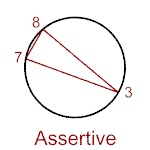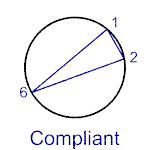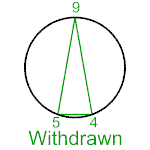The Social Styles
The social styles come from work done in the early 20th century by psychoanalyst Karen Horney. She observed that there were three ways in which people tried to solve their inner conflicts. These three ways also describe how people try to meet their needs.
In practice, we have all three social styles in us in varying degrees. However, we tend to have a dominant style -- the one associated with our type.
The Assertive Style (Types 3,7,8)

People whose dominant Social Style is the assertive style are independent, extroverted and energetic. They are party people who take charge and want to make things happen. They get involved in their environment, meeting life head on, unwilling to withdraw from it. These people know what they want and go directly after it. They have a sense of importance and feel that they are central to the important things in their world. When they are stressed, they reinforce their self-importance and push back against obstacles.
These people often see opportunities and try to take advantage of them. They are great for initiating projects, but sometimes have a hard time seeing them through.
These people are out of touch with their own heart. The heart creates an emotional connection with ourselves and with others. It helps us love and appreciate the value of ourselves and others. To compensate this imbalance, these people seek intensity and stimulation (e.g., adventure and risks)
These people insist and demand that their needs (see the Centres) are met.
The Assertive Style of Threes
Threes want attention and they demand that others give it. Threes feel important and expect others to praise them. When that doesn't work, Threes will determine the values of their "audience" and adapt themselves to be more favourable to others.
The Assertive Style of Sevens
Sevens want security and fulfillment and they demand that others and the world provide it. Sevens feel that they deserve to have fun and entertainment and if they don't get it here, they will seek it elsewhere. When others don't provide satisfaction, Sevens will seek it elsewhere or will try to indulge themselves.
The Assertive Style of Eights
Eights want autonomy and demand that they get it. An Eight will push others out of the way so he can do things his way. Eights want to be in charge and in control of their environment. If they lose that control, they will push back, become confrontational, or contest those who are in charge.
The Compliant Style (Types 1,2,6)

People whose dominant Social Style is the compliant style are responsible, dedicated and want to do what's expected of them. They will do what they believe is best, even if it means sacrificing their own wants. They are committed to their promises, working hard to finish what they said they would do. They have a hard time relaxing or playing, because there is always work to do (and they would feel guilty resting when there is work to do). They have a sense of being a little superior to others, although this characteristic is very subtle. Under stress, they seek advice from their conscience to determine the right thing to do.
These people work great in groups where the rules or procedures are agreed upon. Within that structure, they work tirelessly.
These people are out of touch with their inner guidance. The inner guidance is a mental quality which effortlessly observes and understands what to believe and what to do. To compensate for this imbalance, these people seek belief systems or rules to help them deal with ambiguity and uncertainty. They consult their rules and beliefs to define their position on issues.
These people try to obey internalized rules and principles to get what they want.
The Compliant Style of Ones
Ones want autonomy, so they try to earn it according to the rules. If they do their work better than anyone else, no one will interfere with them). Under stress, Ones escalate their principles into perfectionism or workaholism. If they are perfect, no one has the can criticize them. Ones believe they are morally superior to others.
The Compliant Style of Twos
Twos want attention, and try to get it by following the rules. If Twos love, help, and care enough for others, they will earn attention from others. If Twos do not receive enough attention, they will increase the amount of help they give. If they are all-loving saints, no one will reject them, and they will be loved (the ultimate attention) in return. Twos set themselves up as superior by making others dependent on them.
The Compliant Style of Sixes
Sixes want security, and try to get it by following the rules. If Sixes are sufficiently dedicated and committed to an authority figure, they will earn security from it. If Sixes do not receive enough security, they will either strengthen their commitment to their current authority figure (to give it a chance to provide more security), or they will rebel against it and seek security from another source. Their commitment to their cause/belief/authority figure gives them confidence and makes them look down upon those with different beliefs.
The Withdrawn Style (Types 4,5,9)

People whose dominant Social Style is the withdrawn style are quiet, introverted, and introspective. They enjoy spending lots of time by themselves and feel uncomfortable in large groups. They don't overtly seek attention and don't wish to assert themselves much. The feel uncomfortable taking charge or in competition. Instead, they feel excited by their own imagination. They have a sense of being different from others and not being part of their environment. Under stress, they withdraw from the world and into their inner space and imagination.
These people are not immediately comfortable working in groups and often prefer to work alone. They contemplate and refine their ideas by themselves. They will not present their ideas or assert themselves until they are very confident in their position.
These people are out of touch with their instinctual drives. They have a hard time feeling their vitality and substance. To compensate for this imbalance, they identify more with their fantasies, thoughts, and dreams than with their own physical body.
These people move away from others (withdraw) to get their needs met.
The Withdrawn Style of Fours
Fours want attention and seek it by withdrawing from the superficial world of the ordinary. Fours also withdraw by being different, unique, and mysterious. If Fours are sufficiently unique, distant, and mysterious, they will attract the attention from those who care. Playing hard to get is a test to make sure others care enough about the them. Fours spend a large part of their time daydreaming and fantasizing about the attention they would like. Fours so much enjoy these fantasies that they have a hard time waking up from their daydreams. Under stress, Fours will retreat further into their imagination to sustain their self-image.
The Withdrawn Style of Fives
Fives want security and seek it by withdrawing from a world they see as threatening. Fives also withdraw by minimizing their needs and dependencies. Fives spend large amounts of time studying and thinking about the world -- so much so that they become more attached to their interpretation of the world than to direct observation. Under stress, Fives retreat further into their minds to understand the source of the stress.
The Withdrawn Style of Nines
Nines want autonomy and seek it by withdrawing from an endlessly changing world to get their own peaceful and stable space. Nines also withdraw by minimizing their wants and desires. Nines enjoy their time relaxing and fantasizing about their harmonious world (inner and outer). However, Nines fall into the trap of becoming more attached to their idealized relationships than to their real relationships. Under stress or pressure to change, Nines hang on to their idealizations rather than giving up the stability of the status quo.


